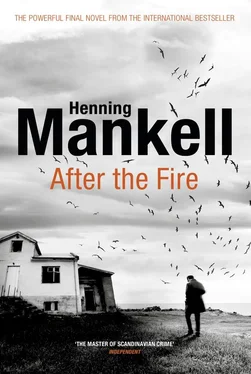‘Not now,’ she said. ‘I’m not being unkind, that’s just the way it is.’
I drove to the harbour. In a field next to the long inlet I saw a skier making his way over the thin covering of snow. A dog was racing along in front of him, as if tracking some unknown quarry.
I parked the car in its usual place. A biting wind was blowing in off the sea. I couldn’t resist the temptation to go and take a look at Oslovski’s garage, but it was all locked up. Through the dirty window I could see the emptiness left behind after the theft of her DeSoto Fireflite. I had a lump in my throat; I missed the person called Oslovski, the person I had hardly known but who had been close to me. Her glass eye had seen me more clearly than others’ eyes. Perhaps I was actually experiencing grief at her loss?
I walked down to the harbour, which was deserted on this New Year’s morning. As I set off for home, the black sea seemed to be feeling the cold just as much as I was.
It snowed during the night of 5 January. When I reached the local history association centre, which was situated in an inlet below the church, I could see footprints leading up from the jetty. I squeezed my boat in between an old wooden craft from Krutholmen and Holmén the pilot’s Pettersson boat from 1942. It looked as if a lot of people had turned up. The tracks in the snow made me think of a flock of crows that had wandered around for a long time before flying away.
The aroma of coffee and a welcoming fire greeted me as I walked into the spacious room. Kolbjörn Eriksson nodded, then came over and shook hands. His own hand was as big as a bear’s paw.
‘Thanks for coming,’ he said.
‘It’s good to see so many people here.’
‘Do you want to say something?’
‘Why would I do that?’
‘Well, your house was the first to burn down.’
I shook my head; I had nothing to say. In the coffee queue I exchanged a few words with people I rarely saw. My ability to remember names has declined dramatically over the years; sometimes I think that much-feared gateway is slowly opening for me. One day I will walk through into the land where memory has been swallowed up by forgetfulness.
I had just got my cup of coffee when Louise called. She knew about the fire, but I hadn’t mentioned the meeting. I quickly explained where I was and promised to call her back later. She said that Agnes would soon be out of her incubator, which made me feel both happy and relieved.
I had counted fifty-six people when Wiman, a retired priest who lived on Almö, clapped his hands and asked for silence. Personally I had never heard him preach, but many people had told me that he divided his parishioners. For some incomprehensible reason, a number of those living out on the islands were annoyed because he never stressed the constant presence of hell and the devil during his sermons. Those who lived on the mainland, however, thought he was an excellent priest who never brought up the darkness of evil unnecessarily when he was standing in the pulpit.
Wiman welcomed everyone, blew his nose, wished us a Happy New Year and blew his nose again. Then he raised his voice with practised ease and bellowed that there must be no more of this insanity, no more setting fire to houses out on the islands. We must all learn to keep a closer eye on our neighbours’ property and take note of any unfamiliar vessels in our waters. We must take responsibility for our brothers and sisters. There was no need for any formal organisation; however, Kolbjörn Eriksson, Ture Jansson and Wiman himself were joining together as a committee. One of them would always be available if anything happened, if anyone had suspicions or was worried.
He opened the discussion to the floor to be met by silence — no one was used to a priest letting others speak. Again he encouraged everyone to ask questions or to comment. Eventually an old fisherman called Alabaster Wernlund from Torpholmen, one of the smallest fishing communities in the archipelago, got to his feet, making an enormous amount of noise with his chair. Everyone knew that he was hard of hearing, that he had a volatile temper and that he not infrequently called the coastguard when he got it into his head that large-scale smuggling was going on around his island. He might be eccentric, but everyone also knew that he had a sharp mind and couldn’t be bamboozled by fancy talk.
He was wearing a red woolly hat and the kind of orange hi-vis jacket you usually see on construction workers.
‘What are we going to do if it turns out that this pyromaniac is here in this room? Surely that’s just as likely as the idea that he’s coming over from Denmark?’
Pontus Urmark immediately stood up. He was a skinny carpenter from the far end of the small islands in Kattskärsvarpen. He might have less sense than Wernlund, but he had just as much of a temper.
‘Why the hell would an arsonist come from Denmark?’ he said. ‘Haven’t they got their own islands?’
‘Belgium, then, if you prefer that!’ Wernlund yelled.
Wiman tried to intervene, but it was already too late. The two men were standing at opposite ends of the hot room, sweat pouring down their faces like two actors fighting over the right to a riposte on stage. Urmark, whose profile resembled that of Karl XII, had the loudest voice, but Wernlund was a worthy opponent; he knew exactly when to make his poisonous remarks.
The quarrel ended just as suddenly as it had flared up. They both sat down in sullen silence, but they were watching one another and might easily launch a fresh attack.
Wiman used the lull in hostilities to return to how important it was for those of us living out on the islands to look out for strangers who appeared in the harbour or on boats around the archipelago. At that point his audience seemed to come to life. Many people wanted to speak or at least waved their hands to show that they were engaged in the debate. A young fisherman from the southern part of the archipelago stood up and said in a trembling voice (I’m not sure if he was nervous about addressing the gathering or flustered because of what he was going to say) that it was these strangers — foreigners, in fact — who were responsible for dragging Sweden further and further down. Perhaps one couldn’t blame these mysterious foreigners for eradicating the fish in the waters of the archipelago; that was down to ‘the bloody Polacks’ as he insisted more than once. Not people from the Baltic countries or Russia. No, the lack of perch these days was definitely down to the bloody Polacks. But the foreigners were clearly responsible for everything else: any form of crime, particularly the theft of outboard motors, break-ins and these arson attacks. Sweden had abandoned its borders. The Sweden that had once been ours had been handed over to the hordes who were now allowed to pour across its borders and help themselves.
I sat in my corner listening to this agitated young man, his freckled face glowing in the heat. He was obviously convinced that he was speaking the truth. At that moment his faith was greater than Wiman’s had ever been. He carried on ranting about foreigners and the politicians who allowed them to ravage our country. He cursed uncontrolled immigration; he applied his verbal branding iron to the forehead of everyone with evil intentions, be they beggars or pickpockets, who were running amok mainly in our cities, but whose presence was increasingly being felt in rural areas and now around our islands.
Then he burst into tears. It was such a shock that the whole room stopped breathing. He covered his face with his hands, his whole body shaking as he slumped back down on his chair. He had come alone; there was no wife or relative to comfort him.
I realised later that his tears were a call to arms. Islander after islander stood up in support of the young man, saying how right he was. Xenophobia, based on nothing more than myths, hearsay and what a friend of a friend had allegedly experienced, settled over the room like a fetid cloud. Few people took a different view. Wiman did his best, but he lacked the strength — and perhaps the conviction. The only one who really protested against the tone was Annika Wallmark, who had a small ceramics workshop just outside the town, but as she was a well-known radical, no one took any notice of her. Murmurs broke out as soon as she opened her mouth.
Читать дальше












